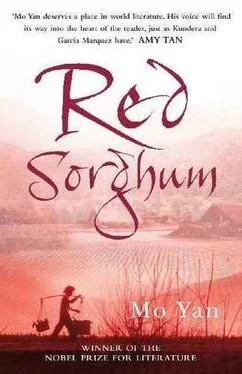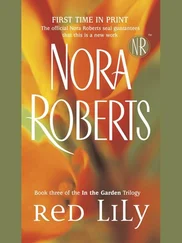Bang, bang, bang . Black Eye’s pistol barked three times, and the physician’s head exploded like a hardboiled egg. Granddad glared at Black Eye.
Iron Society soldiers swarmed into the tent, where the fire was raging. The mule, shrouded in flames, writhed on the ground.
A mad dash for the opening.
‘Put out the fire!’ Black Eye screamed. ‘Hurry! Fifty million tigermount bills to whoever saves the coffin!’
The spring rains had only recently passed, and the pond at the head of the village was filled with water. Together the Iron Society soldiers and common folk who had come for the funeral pushed the red billowing cloud of the burning tent to the ground, and put out the fire.
Green smoke rose from the seared coffin. In the muted light of the dying flames, it seemed as sturdy as ever. The curled body of the mule lay beside it, the stench of its scorched hide filling the air.
THE DATE FOR Grandma’s funeral wasn’t changed in spite of the unforeseen events of the night before. The old Iron Society groom bandaged Granddad’s injury as best he could, while Black Eye watched with a mocking look and recommended postponing the funeral. Granddad emphatically rejected the suggestion. He didn’t sleep a wink that night; he sat on a bench without moving, his bloodshot eyes half open, his cold hand resting on the rough Bakelite handle of his pistol, as though he were glued to the spot.
Father lay on a grass mat and stared at Granddad until he drifted off into a troubled sleep. He woke before daybreak and cast a furtive glance at Granddad, intransigent in the flickering candlelight. His arm was stained with the dark dried blood that had oozed out from under the bandage. Not daring to say anything, Father closed his eyes again until the five funeral musicians hired for the event ran up against the envious local musicians, and their battle of horns disrupted everyone’s sleep. Father’s nose began to ache; scalding tears flowed from his eyes and ran into his ear. Here I am, he was thinking, nearly sixteen already. I wonder if these turbulent days will ever end. He looked at his father’s bloody shoulder and waxen face, and a feeling of desolation that didn’t suit his tender years entered his heart.
A lone village rooster announced the coming day, and a predawn breeze carried the acrid smell of spring into the tent, where it caused the candles to flicker. The voices of early risers were now discernible; warhorses tethered to nearby willows began pawing the ground and snorting; Father curled up comfortably, and thought of Beauty, who would one day be my mother, and the tall, robust woman Liu, who should rightfully be considered my third grandma. They had disappeared three months earlier, when Father and Granddad had gone for training with the Iron Society to a remote little outpost south of the railway tracks; when they returned, their huts were empty and their loved ones gone. The sheds they’d thrown up in the winter of 1939 were covered with cobwebs.
As soon as the red morning sun had made its entrance, the village came to life. Food peddlars raised their voices to attract customers, as the steamy, tantalising odours of buns in ovens, won tons in pots, and flatcakes in skillets began to waft through the air. A pockfaced peasant argued with a peddlar of buns, who refused to accept North Sea currency; the peasant had none of the Iron Society’s tiger-mount currency. By then twenty of the little buns had already found their way into the peasant’s stomach. ‘That’s all I’ve got,’ he said. ‘Take it or leave it.’ The crowd urged the peddlar to accept the North Sea currency, whose value would be restored as soon as the Jiao-Gao regiment fought its way back. He did, and moved on, raising his voice: ‘Buns! Meat-filled buns! Fresh from the oven!’
The tent showed the effects of the raging fire of the night before. Iron Society soldiers had dragged the physician and his scrawny mule the fifty paces or so to the inlet, where the stench of their scorched bodies attracted scavenger birds. The area around Grandma’s coffin had been swept clean of torn canvas, and the occasional unbroken wineglass lying in the cinders had been smashed by rakes. Grandma’s coffin shone in the early-morning light, hideous and scary. The deep-scarlet surface, once so sombre and mysterious, had been eaten away by flames, and the thick varnish had melted and split, leaving a maze of deep cracks. The coffin was so enormous that, as my father stood at its sweeping head, it seemed like the tallest thing in the world, and he had trouble breathing. He recalled how the coffin had been seized, and how its owner, an old man who must have been at least a hundred and still wore his white hair in a little queue, had refused to let go of the front edge:
‘This is my home…. No one else can have it…. I was a licentiate in the Great Qing dynasty, even the county magistrate called me “elder brother”…. You’ll have to kill me first… you pack of brigands….’ His tears had given way to curses.
Granddad had stayed behind that day, sending a cavalry detachment under the command of his trusted lieutenant to confiscate the coffin. Father tagged along. He had heard that this particular coffin had been made in the first year of the Republic from four pieces of cypress, four and a half Chinese inches thick. It had been varnished yearly ever since, thirty coats already. The ancient owner rolled on the ground in front of the coffin, and it was impossible to tell if he was laughing or crying. Clearly he had lost his mind. The lieutenant tossed a bundle of Iron Society tiger-mount currency into his hands and said, ‘We pay for what we take, you old bastard!’ The old man ripped open the bundle and began tearing at the bills with his few remaining teeth as he cursed: ‘You bunch of bandits, not even the emperor stole people’s coffins…. You brigands…’ ‘You old bastard offspring of a stinking donkey!’ the cavalry-detachment commander shouted back. ‘Now, you listen to me. Everybody has a role in the war of resistance against Japan. Consider yourself lucky if they roll you up in sorghum leaves and dump you in the ground. How the hell do you rate a coffin like this? This coffin is for a hero of the resistance!’ ‘What hero?’ ‘The wife of Commander Yu, who is now in charge of the Iron Society, that’s who.’ ‘Heaven and earth won’t allow it, they won’t allow it! No woman can sleep in my home…. I’ll kill myself first….’ He ran towards the coffin and rammed his head straight into it, producing a hollow thud. Father saw the scrawny neck bury itself in his chest and the flattened head sink into the space between his bony shoulders…. Father could still see the tufts of white hair in the old man’s nostrils and the wispy goatee on his chin, which jutted up like a gold ingot.
Granddad made a sling out of black cloth for his injured right arm; his gaunt face was deeply etched with exhaustion. The commander of the cavalry detachment walked over from the ring of horses and asked him something. Father heard him answer, ‘Five Troubles, you don’t need to ask my permission. Go ahead!’
Granddad looked long and meaningfully into the eyes of Five Troubles, who nodded, turned, and walked back to the horses.
Just then Black Eye emerged from one of the other sheds and stood in front of Five Troubles to block his way. ‘What the hell are you up to?’ he asked angrily.
‘I’m posting sentries on horseback,’ Five Troubles said with a scowl.
‘I didn’t give the order!’
‘No, you didn’t.’
Granddad walked up and said with a wry smile, ‘Blackie, are you sure you want to take me on?’
‘Do whatever you want,’ Black Eye said. ‘I was only asking.’
Granddad patted his broad, round shoulder with his good hand and said, ‘You’ve got a role in this funeral, too. We can settle our differences afterwards.’
Читать дальше












